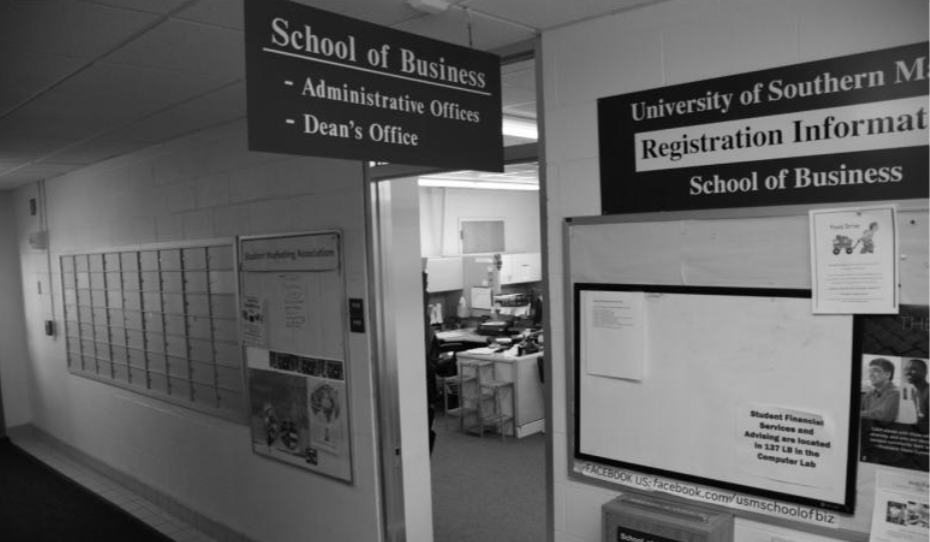By: Sam Margolin, Staff Writer
A new home for USM’s MBA program is still in the planning stages after almost five years. Since 2013, the process of how to combine the MBA and Law programs of USM and UMaine Orono, and build a new graduate center to house them, has been frustrating and stalled. Changes in the CEO of the new project coupled with a lack of academic cooperation has left the project in limbo.
The program is funded by The Alfond Foundation, a charity founded in 1950 to support education, healthcare, and youth development. The Alfond Foundation is organized as a trust and is run by a Board of Trustees currently headed by George W. Powell. The Alfond Foundation along with the President Glenn Cumnings and the Chancelor James H. Page lead the effort to make the new program and graduate center a reality.
The CEO put in charge of the new graduate center, Eliot Cutler, announced over the summer that he would be resigning as head of the graduate center. USM President Glenn Cummings appointed George Campbell, president of the University of Southern Maine Foundation, as interim CEO.
Of the proposed $150 million it will take to complete the new center that will house the new graduate business programs, The Alfond Foundation has given a $7.5 million challenge grant to help build the new Portland-based graduate center. This leaves a lot of funding outstanding, especially when considering USM’s financial needs elsewhere, such as facility upkeep, construction, re-construction and marketing.
The program has been in the works for many years in part due to the fact that UMaine Orono and USM business faculty must come together to resolve some of the issues. The first step in creating a new curriculum that can be accepted and accredited is to find a dean to head the new department. This has been difficult in itself. Two members of each school’s MBA faculty and a few other chosen administrators make up a search committee tasked to find a worthy dean. The two from USM are Prof. James Suleiman and Richard Bilodeau.
The MBA programs of UMaine and USM different in two key ways: curriculum and residency. According to Susan Feiner, Professor of Economics and Gender studies at USM, UMaine has a more traditional curriculum that is offered at dozens of other schools whereas USM’s is more practitioner-driven because of all the connections to local businesses. As for residency, the UMaine degree is primarily online whereas the USM degree is primarily face-to-face. What’s being proposed is a low-residency program that meets on weekend three or four times a semester making it less attractive to commuter and nontraditional students. The MBA program changes should make student life easier, not harder.
Some faculty members like the idea of the new changes. Jane Kuenz, The Associate Dean of USM’s School of Business College of Management and Human Services believes students entering the program under the new MBA configuration, will welcome increased resources and opportunities that the combined faculty can offer. “If anything, making southern Maine the focus for graduate business education in the state will create synergies that will reach down to the undergraduate level. Students enrolled in USM’s MBA will be given the option to finish that degree or transfer to the new program once it’s official,” said Kuenz. The fact that Portland is the center of Maine’s economy is unquestionable. To house the program here is not the question— the question is how to do it.
USM Provost Jeannine Diddle Uzzi agrees, “The hope is that by coming together and pooling both resources and expertise, the business faculties from UMaine and USM will create a new, reinvigorated MBA curriculum that neither faculty could have created on its own.”
Provost Uzzi points out that the academic community is just that: a community. In order to fight through challenges of collaboration it must be recognized that the end goal is a happier student body.
“There will naturally be challenges related to delivering a UMaine degree on a USM campus with a combined UM-USM faculty, but those challenges should be invisible to students. The challenges we face when we collaborate across UMaine System universities ought to be overcome for a variety reasons, and when we overcome those challenges, we will have overcome them not only for MBA students but for students in all academic programs at any school in the University of Maine System,” Uzzi said.
“The idea is to bring in industry experts as well,” Said Joanne Williams, Dean of the College of Management and Human Service. Williams said she knew that once things get going, a group will be organized consisting of faculty from both schools as well as outside help. The outside help could provide crucial insight to how other schools have integrated programs like this.
Some faculty are critical that USM should spend so much money on what accounts to only a few hundred students. Roughly 700 students graduate from the UMaine and USM MBA programs each year. So the question is aren’t there better ways to use the money for the greater good? Other aesthetic motivations could be behind the new programs importance. USM’s law building was just voted one of the eight ugliest university buildings in the country by Architectural Digest. Other Portland buildings are dilapidated and old buildings like Luther Bonney and Payson Smith. University leaders will continue to weigh the pros and cons of locations, costs, and new construction to meet a mission that best serves the program and the students all over the state.


Leave a Reply